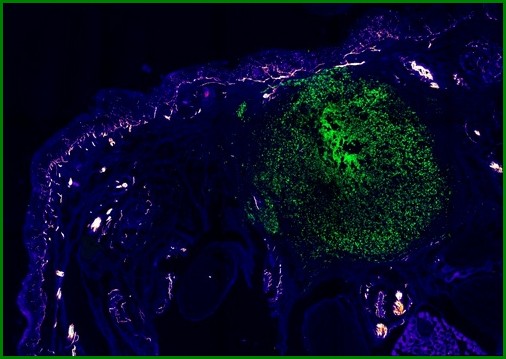Bacteria trigger pain receptors and weaken the immune system resistance to bacteria are not so simpletons, if not the only community to come together to resist the host immune system, but also the launch of his pain receptors to weaken the resistance of the latter.

Staphylococcus aureus (green), stealing up to the painful nerve (white) in mouse skin (photo authors of the work).
It is believed that the pain is caused by inflammation of the immune system. Whatever the infection, it causes a certain sequence of immune reactions that result in the infected tissue comes a host of immune cells appear swelling, suppuration, etc., and at the same time - the pain. That is a pain in the teeth with caries and abdominal pain in intestinal infection - it's just a side effect of the immune system.
However, this view will probably be revised. Researchers izDetskoy Hospital Boston (USA), make sure that the bacteria themselves can stimulate pain neurons. It all started with the fact that Isaac Zhao and his colleagues decided to see how to interact with neurons and immune cells during infection.
Cultivating those and others in the presence of bacteria, the researchers found that the neurons respond to the infection without regard to immunity.
In another experiment, the researchers were compared by bacteria code mice infected with Staphylococcus aureus, the size of the inflammatory edema, the number of immune cells and the level of pain. It was found that the level of pain was correlated with the number of live bacteria, and peak pain does not coincide with the peak of inflammation, stepping before the swelling has reached its maximum size.
In the journal Nature, the authors report that the bacteria were isolated two types of substances that directly affect the neurons. First, it was N-formylated peptides to which pain neurons have specific receptors, mice lacking these receptors weaker felt pain. Second, it was blowing toxins that are embedded in the cell membrane, forming it big time, which is starting to go through the flow of ions, stimulating neuronal activity.
But that's not all: it turned out that the pain receptors can interact with immune cells, telling them to reduce their activity. Activation pain neurons resulted in decreased monocyte and neutrophil influx into the site of infection - namely from these cells is largely dependent immune response force. It was possible to determine even a peptide molecule with which pain neurons reported immune cells that is necessary to reduce the synthesis of inflammatory signaling proteins.
However, the bacteria still antigens, whole bacteria or molecule fragments that are released into the bloodstream, and ultimately arrive in lymph nodes, where they are picked up by the B-cells produce antibodies. It was found that the pain receptors inhibit this and Department immunity: slow migration of neural cells, T cells and B cells in the lymph nodes. Needless to say, that in mice with disabled pain receptors with both versions of the immune response was normal.
According to the authors, the ability to directly cause pain not only in S. aureus, but other bacteria.
That is, as we see, not only the bacteria causing the pain, but also with the pain suppress the immune response against itself.
Obviously, he felt bacteria, pain receptors are trying to protect the tissue from additional damage that would cause an inflammatory response, but the bacteria to give an advantage. And if it were possible to create a cure, the overwhelming reaction of pain receptors for bacterial signals, it will not only remove the pain, but also help to immunity to quickly deal with the disease.
in the footsteps of Medical Xpress, Shutterstock, compulenta.computerra.ru